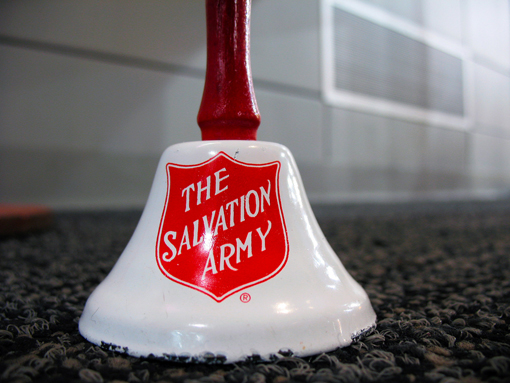Many know the Salvation Army for their charitable work in disaster relief, their thrift stores, youth programs, and for also being the third largest non-profit organization not in the States but the entire world, grossing billions of dollars a year in donations. And of course they are iconic during the holiday seasons with their workers posted up in front of malls and grocery stores, and the such, ringing their bells in front of their red kettles.
But there’s a seedier side of the Salvation Army that they don’t talk about as much: the fact that they’re extremely anti-homosexual. Of course, this isn’t much news considering that they’re still an Evangelical Church that was established not only to help those in need but also spread the word of Christianity. But year after year, they’ve become increasingly involved with stopping same-sex legislation that would help homosexuality become accepted, and perhaps curb the amount of violence directed solely at homosexuals. All of which suggests the Salvation Army’s use of manipulative measures to control how society views homosexuals—though failing in the end.
On their website it states, “Christians whose sexual orientation is primarily or exclusively same-sex are called upon to embrace celibacy as a way of life.” They’ve also used political influences, especially with the Bush Administration, and religious-justifications to get around fair-hiring practices so that they can discriminate against hiring homosexuals. But perhaps their most reckless and hateful proposal came in 2004 when they threatened to close down every New York City soup kitchen if they were forced to offer benefits to same-sex couples, a $250 million contract that would have lost them $70 million in direct funding and would have hurt countless millions that depend upon their charitable services.
The Salvation Army has also used millions, if not billions, of dollars in donation money not to help out more people in need, but to hire lobbyists to try and influence political leaders to stop legislation that could potentially benefit homosexuals in multiple countries, like New Zealand in 1986 when a law was about to be passed to decriminalize homosexual sex, and the United Kingdom when they pushed for an amendment in the Local Government Act that would prevent legislators and political leaders to paint homosexuality in anything but a negative light, and in the United States when in 2001 they tried to convince former President Bush to deny funding to any city or state that had LGBT non-discrimination laws.
While many of you might be thinking, well, it’s a church at its core based on Christian principles, so it’s not surprising that they’re so anti-homosexual. But that still doesn’t justify many of their actions in spending billions of dollars in multiple countries of donation money that many donators believed was being used to help the needy, not help in the Salvation Army’s fight against homosexuality.
Historically, the Salvation Army, yeah, was built on principles of Christianity that many can and do interrupt as being non-friendly towards same-sex couples. They also began as a small congregation that mainly attracted vagrants, drug-addicts, alcoholics, and other “non-desirables” in the late-19th century. In essence, the Salvation Army was originally created to help out those in need who had been overlooked by mainstream society, which is a very admirable characteristic. But somewhere down the line, becoming the third largest non-profit organization must have gotten to their head, because now they use a significant fraction of donation money to implement discriminatory practices with political agendas that don’t serve the community as they originally intended, but splits the community into factions.
But this is not to suggest that the Salvation Army does not do good within communities. Still, though, there are plenty of other non-profit organizations with no political agendas and that don’t use your donation money to fund anti-homosexuality legislation. In end, the most important caveat to take away: always know where your money is going when you donate to a non-profit. It’s not a bad thing to donate to charities, just so long as those charities act charitable.
The Underbelly of the Salvation Army,





Pingback: The Underbelly of the Salvation Army | Armyrats